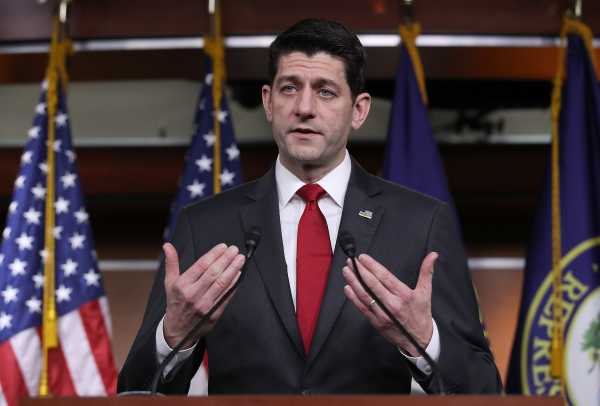
Republican lawmakers are pushing back hard against President Donald Trump’s quest to impose sweeping tariffs on steel and aluminum imports — and some are reportedly even considering using legislation to block him from doing so.
Ever since Trump announced on Thursday that he plans to impose 25 percent tariffs on steel imports and 10 percent tariffs on aluminum imports, he’s caused a panic among members of his own party, who tend to oppose creating trade barriers of any kind around the US economy.
Congressional Republicans are worried about the prospect of sparking trade wars with key US allies who ship steel and aluminum to the US. Canada and Europe have already threatened to strike back with taxes on US exports if Trump really pulls the trigger on his tariffs.
They’re also concerned that the tariffs will raise the price of American-made goods that contain aluminum and steel, and slow down the economy as the 2018 midterm elections approach.
That’s why congressional Republicans are lobbying the White House privately and campaigning publicly to get Trump to change his mind. They’re hoping to remind him that while steel and aluminum producers and his most die-hard supporters might support the tariffs, many other groups that are important to his political fortunes, like automakers and large swaths of corporate America that rely on international trade, are strongly opposed to them.
If Republicans can’t persuade the president, they could try to force his hand with legislation limiting his authority on tariffs. It would be a remarkable moment: Trump being handcuffed by his own party on a signature policy priority.
Many Republicans have tried to refrain from criticizing Trump on issues ranging from his foreign policy to his communication style, but they appear to be taking a harder line here — and it could cause a lasting rift between the White House and Capitol Hill.
Republicans are mobilizing quickly and aggressively against the tariffs
House Speaker Paul Ryan has made it plain that he opposes these tariffs.
“We are extremely worried about the consequences of a trade war and are urging the White House to not advance with this plan,” said Ryan spokesperson AshLee Strong in a statement on Monday. “The new tax reform law has boosted the economy and we certainly don’t want to jeopardize those gains.”
Ryan’s office also sent a mass email to reporters on Monday linking to a CNBC article that said the stock markets had dropped in response to Trump’s tariffs.
Rep. Kevin Brady (R-TX), chair of the House Ways and Means Committee, which oversees trade policy, met Trump at the White House twice last week to make the case against the tariffs and suggest alternative proposals for how to revive American steel.
Sen. Lindsey Graham (R-SC) has been campaigning fiercely to turn public opinion against Trump’s tariffs. “You’re punishing the American taxpayers, and you are making a huge mistake,” Graham said Sunday on Face the Nation, in remarks directed at the president.
Graham framed Trump’s tariffs as a victory for China. While China is the chief source of the global oversupply of steel and aluminum, it currently ships little steel and aluminum to the US because of previously imposed trade barriers.
“China wins when we fight with Europe,” Graham said.
Republicans might do more than just criticize the president
So far, Trump isn’t showing signs of budging. During an Oval Office meeting on Monday, he told the press that he’s “not backing down” on his proposed tariffs.
If Republicans are unable to sway the president with their criticism, they might take action on Capitol Hill to stop him. Politico reports that congressional Republicans are considering legislation that would prevent Trump from imposing his tariffs.
Congress has formal authority over trade policy under the US Constitution, but it has generally delegated much of its authority to the executive branch in modern times.
It’s unclear what the legislation would look like at this point, but one hardball tactic would be to add it as a provision to a crucial spending bill at the end of the month.
If Republicans are able to get a veto-proof majority to back some kind of bill limiting Trump’s authority to issue tariffs, it would echo the time when Republicans forced Trump to impose sanctions on Russia last August and locked old sanctions against the country into law instead of leaving them as executive orders that Trump could unilaterally rescind.
Outside the GOP leadership, Trump’s tariffs are playing differently with different crowds. Steel and aluminum producers, naturally, support the tariffs. But industries that rely on steel and aluminum, like automakers or certain parts of the beverage industry, have been harsh critics of them.
American farmers — a key part of Trump’s political base — are worried that if countries retaliate against the US for these tariffs, their agricultural exports could bear the brunt of those punishments.
A Morning Consult poll from February showed that 59 percent of Americans support the idea of imposing steel and aluminum tariffs — but specifically if they hit China. It’s unclear how public perception of the tariffs would play out if it becomes widely known that these tariffs primarily hit the US’s closest friends instead.
Trump is at a major crossroads with these tariffs. While he is wildly inconsistent in most policy realms, he has been persistent about his desire to impose tariffs on imports to boost struggling parts of the American economy. He clearly believes these tariffs would deliver on one of his most prominent America First promises.
But in the process, he could cause a big rift with his own party and alienate large swaths of his base. And if the economy is hit too hard by trade wars, Trump could tarnish the strongest feature of his presidency so far.
Sourse: vox.com






